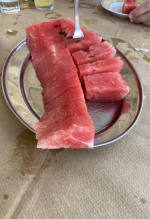I know how to speak Greek okay, but I am not great at it. I want to brush up on my skills, and I also want to teach some of my family members. I am good enough at it to the learn the basics. I am looking for advice, but I've also compiled some ideas:
1. Spend an extended period of time in Greece
There’s no better way to learn Greek than to immerse yourself in the language and culture of Greece. If you have the opportunity, consider spending an extended time in Greece, studying or working, taking a sabbatical, or just exploring the country. Living in Greece can help you understand the nuances of the language, such as the different accents, dialects, and slang that are used. You’ll also have the chance to practice your Greek with locals, watch Greek TV or films, and read Greek books or newspapers. I would imagine this is the best way to learn fast!
2. Use a language program
If you can’t travel to Greece or you prefer a more structured approach to learning Greek, consider using a language program. There are many language programs available online or in your local area, ranging from self-paced courses to interactive classes. Some popular language programs for Greek include Rosetta Stone, Duolingo, and Pimsleur. From what I understand these are all great options and I can learn at my own pace.
3. Take classes
Taking classes is another excellent way to learn Greek, especially if you prefer face-to-face interaction and feedback. You can find Greek language classes in community colleges, universities, language schools, or private tutors. Taking classes can help you improve your Greek skills, such as listening, speaking, reading, and writing. You’ll have a teacher who can guide you through the learning process, answer your questions, and give you homework or assignments that challenge you. You’ll also have classmates who share your passion for Greek and can practice with you.
4. Find ways to immerse yourself outside of Greece
Even if you can’t go to Greece or attend classes, you can still immerse yourself in Greek in your daily life. One way is to find Greek-speaking communities or events in your area, such as cultural centers, festivals, or meetups. You can also use online resources to connect with Greek speakers, such as language exchange websites, social media groups, or chat apps. Listening to Greek music, watching Greek videos or podcasts, or reading Greek literature can also help you familiarize yourself with the sounds and patterns of the language.
Honestly, I plan to try all 4 - whatever I can do. I think it will all help.
 This pic is from two summers ago, oh how I wish I could go back
This pic is from two summers ago, oh how I wish I could go back



